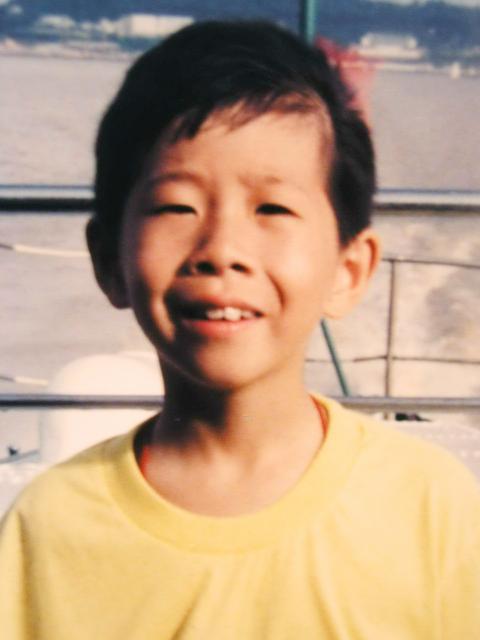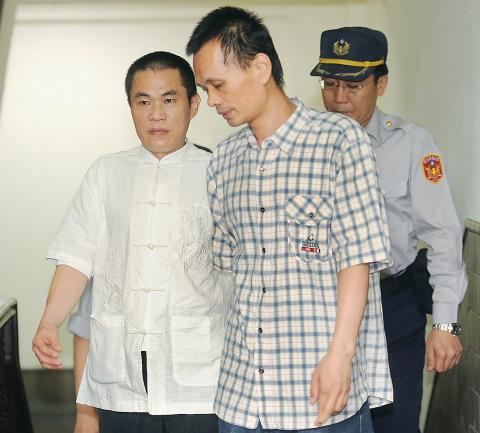Chiou Ho-shun (邱和順) exhausted his final appeal yesterday when the Supreme Court reaffirmed a death sentence for kidnapping and murdering a nine-year-old boy more than two decades ago.
The decision ends the nation’s longest-running legal battle, which saw the case shuffled back and forth between various courts, with allegations by judicial reform advocates that evidence was acquired through torture and forced confessions.
The Supreme Court yesterday ruled that Chiou, detained for most of his adult life, received a fair trial and deserved to die for his 1987 slaying of Lu Cheng (陸正), a boy that prosecutors said he kidnapped, dismembered and then threw in the ocean after a botched kidnapping.

Photo: Courtesy of Lu Cheng’s family
He was also found guilty of the separate robbery and murder of an insurance agent who had just won a lottery-like game popular at the time — receiving another death penalty verdict in the same ruling.
A spokesperson for his pro bono legal team, Lin Feng-jeng (林峰正), called the decision “unacceptable,” saying that the abrupt finding came before the court had time to finish reviewing new information provided by the defense.
“The Supreme Court used two months to affirm a controversial ruling from a lower court in a 23-year-old case. It’s too soon and we believe it to be completely unacceptable that a person’s life can be decided this way,” Lin said.

Photo: Liao Chen-huei, Taipei Times
However, the ruling cited overwhelming proof in support of the verdict, based on eyewitness accounts and other evidence.
Chiou and several accomplices are said to have kidnapped the nine-year-old boy when he was walking home from school on Dec. 21, 1987, in a case that dominated media headlines at the time. Prosecutors said Lu resisted the kidnap attempt by Chiou’s girlfriend and was killed after he bit Chiou’s finger.
Prosecutors said that when Lu’s parents later received a ransom note for NT$5 million (US$173,000), the boy was already dead, having been dumped off the coast of Hsinchu County after being dismembered. The boy’s parents paid NT$1 million to the captors.
After a tip-off in September the following year, police arrested three suspects, who quickly confessed to the kidnapping and also the separate murder of Ko Hung Yu-lan (柯洪玉蘭), the insurance agent. Chiou, in detention for another case at the time, was implicated as the head of the criminal ring.
Police eventually obtained confessions from 11 suspects, but as more details surfaced, -discrepancies emerged in their accounts, including contradictions on where the body was disposed of. Charges against most of the other suspects have since been dismissed.
Chiou, his girlfriend, Wu Shu-chen (吳淑貞), and Lin Kun-ming (林坤明) are the only defendants to have been found guilty. The Supreme Court yesterday also upheld 10 and 17-year sentences for Wu and Lin, in line with the High Court ruling.
Lawyers for Chiou and the two other defendants said the murder investigation into Lu’s killing was riddled with problems, including a lack of forensic evidence linking them to the crime. The murder weapon, body and clothes of the victim were never found and prosecutors have based their case on the confessions.
Two prosecutors and 10 police officers involved in the case were impeached by the Control Yuan more than a decade ago for using violence and threats to acquire speedy confessions — which were still accepted as evidence.
In administrative limbo for much of the past two decades, the Supreme Court in the past continuously refused to confirm the High Court death sentence, citing flaws in the process. The case, as a result, bounced between the two courts while Chiou was kept behind bars.
They would have been released by the middle of next year if the stalemate had kept up following passage of an act designed to speed up criminal proceedings by lawmakers last year. The Speedy Criminal Trials Act (刑事妥速審判法) sets a maximum detention period of eight years for accused murderers.
The three suspects’ 23-year detention without a final conviction has been often cited by judicial advocates as reason to pass the act, designed to free defendants in the event of indecision between courts.
However, Lin said those efforts could have backfired based on yesterday’s Supreme Court ruling, which will send Chiou to death row.
“Instead of providing a way out for suspects indefinitely detained, judges have apparently become more motivated to clear their docket before May next year, when the law comes into effect,” he said. “They’re eager to keep them behind bars.”
Lawyers for Chiou and two accomplices had previously expected that the Supreme Court would again order a re-trial of May’s High Court ruling, as the court had done 11 times in the past.
His legal team said their petitions would continue, although they did not know in what form.
Lu’s father, Lu Chin-te (陸晉德), was unavailable for comment as of press time.
According to staff at Lu Chin-te’s company, the Lu family are currently travelling in the UK and are probably unaware of the lastest ruling.
In a previous interview with the Liberty Times (the Taipei Times’ sister paper), however, Lu Chin-te said that “delayed justice is not justice,” adding the case, bogged down for so many years, had taken its toll on the family, body and soul.
ADDITIONAL REPORTING BY WANG CHING-YI

ACTION PLAN: Taiwan would expand procurement from the US and encourage more companies to invest in the US to deepen bilateral cooperation, Lai said The government would not impose reciprocal tariffs in retaliation against US levies, President William Lai (賴清德) said yesterday, as he announced five strategies to address the issue, including pledging to increase Taiwanese companies’ investments in the US. Lai has in the past few days met with administrative and national security officials, as well as representatives from various industries, to explore countermeasures after US President Donald Trump on Wednesday last week announced a 32 percent duty on Taiwanese imports. In a video released yesterday evening, Lai said that Taiwan would not retaliate against the US with higher tariffs and Taiwanese companies’ commitments to

Intelligence agents have recorded 510,000 instances of “controversial information” being spread online by the Chinese Communist Party (CCP) so far this year, the National Security Bureau (NSB) said in a report yesterday, as it warned of artificial intelligence (AI) being employed to generate destabilizing misinformation. The bureau submitted a written report to the Legislative Yuan in preparation for National Security Bureau Director-General Tsai Ming-yen’s (蔡明彥) appearance before the Foreign Affairs and National Defense Committee today. The CCP has been using cognitive warfare to divide Taiwanese society by commenting on controversial issues such as Taiwan Semiconductor Manufacturing Co’s (TSMC, 台積電) investments in the

HELPING HAND: The steering committee of the National Stabilization Fund is expected to hold a meeting to discuss how and when to utilize the fund to help buffer the sell-off The TAIEX plunged 2,065.87 points, or 9.7 percent, to close at 19,232.35 yesterday, the highest single-day percentage loss on record, as investors braced for US President Donald Trump’s tariffs after an extended holiday weekend. Amid the pessimistic atmosphere, 945 listed companies led by large-cap stocks — including Taiwan Semiconductor Manufacturing Co (TSMC, 台積電), Hon Hai Precision Industry Co (鴻海精密) and Largan Precision Co (大立光) — fell by the daily maximum of 10 percent at the close, Taiwan Stock Exchange data showed. The number of listed companies ending limit-down set a new record, the exchange said. The TAIEX plunged by daily maxiumu in just

‘COMPREHENSIVE PLAN’: Lin Chia-lung said that the government was ready to talk about a variety of issues, including investment in and purchases from the US The National Stabilization Fund (NSF) yesterday announced that it would step in to staunch stock market losses for the ninth time in the nation’s history. An NSF board meeting, originally scheduled for Monday next week, was moved to yesterday after stocks plummeted in the wake of US President Donald Trump’s announcement of 32 percent tariffs on Taiwan on Wednesday last week. Board members voted to support the stock market with the NT$500 billion (US$15.15 billion) fund, with injections of funds to begin as soon as today. The NSF in 2000 injected NT$120 billion to stabilize stocks, the most ever. The lowest amount it